- Home
- Blog
- Web Design Six Questions: Tony Chester on Running a Design Firm
Six Questions: Tony Chester on Running a Design Firm
-
 13 min. read
13 min. read
-
 William Craig
William Craig CEO & Co-Founder
CEO & Co-Founder
- President of WebFX. Bill has over 25 years of experience in the Internet marketing industry specializing in SEO, UX, information architecture, marketing automation and more. William’s background in scientific computing and education from Shippensburg and MIT provided the foundation for MarketingCloudFX and other key research and development projects at WebFX.
 Tony Chester is the man behind OnWired – a successful, progressive, award-winning web design and web development firm responsible for making stunning and captivating web solutions for clients in various industries. Tony Chester, along with the OnWired Team, also runs Your Web Job, a newly-released hub for job-seeking web professionals that’s steadily gaining popularity and Please Critique Me, a site where designers can seek free critiques and advice on their designs. Tony’s known for pushing the envelope and never settling on the status-quo, and it has allowed him to not only garner top clients, but also some of the best and well-regarded designers and developers in the industry.
Tony Chester is the man behind OnWired – a successful, progressive, award-winning web design and web development firm responsible for making stunning and captivating web solutions for clients in various industries. Tony Chester, along with the OnWired Team, also runs Your Web Job, a newly-released hub for job-seeking web professionals that’s steadily gaining popularity and Please Critique Me, a site where designers can seek free critiques and advice on their designs. Tony’s known for pushing the envelope and never settling on the status-quo, and it has allowed him to not only garner top clients, but also some of the best and well-regarded designers and developers in the industry.
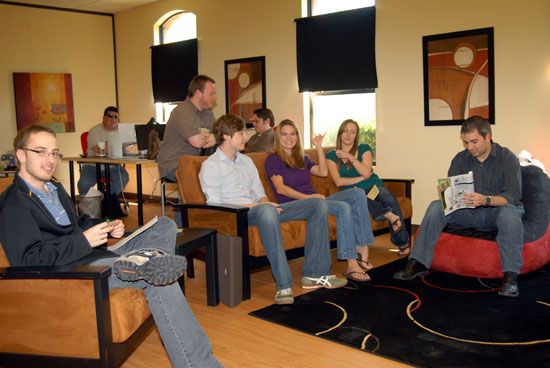 In this interview, Tony Chester answers questions about his experience running a successful design and development firm. He offers pointers, insights and encouragement for those of us thinking about entering the competitive but rewarding business of establishing a creative agency.
In this interview, Tony Chester answers questions about his experience running a successful design and development firm. He offers pointers, insights and encouragement for those of us thinking about entering the competitive but rewarding business of establishing a creative agency.
1. What were the steps you took in establishing a design firm? Walk us through your path from conception to OnWired at its current state.
I started OnWired back in 2001 as a side gig to release some inner angst and to create some job security. You see, I was working for a big corporation at the time.
I was stuck using the same color blue and the same boring fonts day after day, and it was driving me insane. I pulled together a couple of my peers who were in the same boat, brainstormed company names for a few weeks, and then gave birth to OnWired. 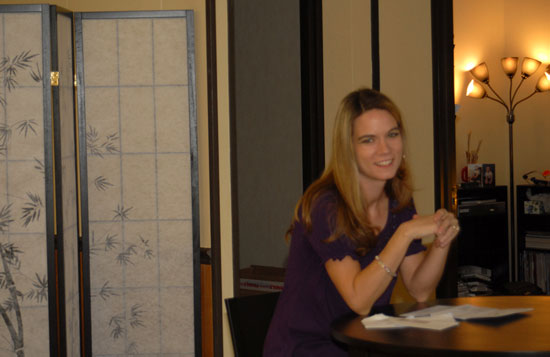 The two guys I recruited got cold feet and jumped ship, but I’m quite persistent, so I started moonlighting and kept things going.
The two guys I recruited got cold feet and jumped ship, but I’m quite persistent, so I started moonlighting and kept things going.
At the same time, layoffs were happening left and right, and I saw the writing on the wall. Three years later, I finally received my walking papers. They gave me a hefty severance package, so I told my wife we would give OnWired a go for a year and see what happened.
As luck would have it, I boosted my organic search rankings with some good old fashioned SEO and leads started rolling in. Since OnWired was a one man shop at the time, I was constantly outsourcing the heavy lifting, so I needed to find a reliable local developer. Long story short, I went through a couple of partnerships but eventually landed back on my own in late 2006. Enter Jon Norris. Jon and I had worked together at the aforementioned big corporation. I knew his design skills were superior to mine, so I was constantly in his ear about helping out.
His responses were always the same: “Stop bugging me — I’m busy.” He eventually got tired of his mundane job, so we teamed up and changed the direction of the business. 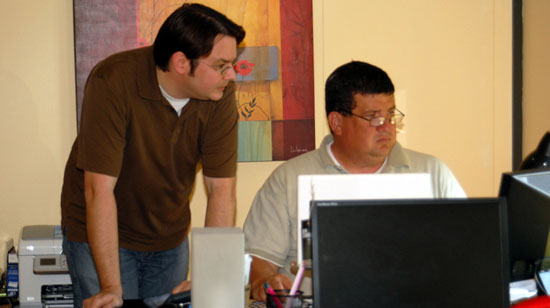 After a few months of working in a coffee shop, we moved into an extravagant 600 square foot, 30 year old dungeon. We hired a couple of developers, and we quickly learned that jumping from Joomla to Smarty to .NET to Rails wasn’t doing us any favors. We settled on some standards (things like ExpressionEngine, CodeIgniter, and PHP) and stopped taking on any and every project that was thrown at us.
After a few months of working in a coffee shop, we moved into an extravagant 600 square foot, 30 year old dungeon. We hired a couple of developers, and we quickly learned that jumping from Joomla to Smarty to .NET to Rails wasn’t doing us any favors. We settled on some standards (things like ExpressionEngine, CodeIgniter, and PHP) and stopped taking on any and every project that was thrown at us.
This helped us to focus and become experts at a core group of technologies. In November of 2007, we launched our redesigned website, submitted it to a few galleries, and watched our traffic shoot through the roof. The site was a big hit and really put us on the map.
Since then, we’ve continued to grow the business as our workload increases. We now have a team of 9.
2. What traits do you look for when you’re hiring an employee?
First impressions are key. If you can wow me with your wit and writing skills in your cover letter, you’ve got my attention. If you’re just copying and pasting a boring generic cover letter, it goes right in the circular file.
 Second, before getting in the door, you need to be able to demonstrate your ability to design and/or develop usable websites. If you’re a “web designer” with only print work to show, that’s a problem. If you’re a “developer” who only does all-Flash sites, that’s a problem too.
Second, before getting in the door, you need to be able to demonstrate your ability to design and/or develop usable websites. If you’re a “web designer” with only print work to show, that’s a problem. If you’re a “developer” who only does all-Flash sites, that’s a problem too.
We want to see a solid portfolio, and we look for bad habits as well as the good. Once you make it in for a chat, I want to see how well your personality fits in with our group (no cocky rockstars, please), how you interact, what you do in your free time, and how you stay current on industry trends. Quick note on our interview process: we typically gather around the TV on couches and bean bag chairs and just talk shop.
We definitely don’t do hardcore interviews with hundreds of useless hypothetical questions.
3. How did you first start getting clients and what tips can you share for people struggling to find clients?
Honestly, I’m not sure how I landed my first client. I was trying all sorts of things to get some exposure. My site wasn’t ranking organically at the time, so I started running some pay-per-click ads.
Unfortunately, those ads resulted in me getting a lot of resumes. Around the same time, I joined the local chamber of commerce, mailed out 500 postcards to their members, sat back, and waited for the calls. Eight years later, I’m still waiting to see results from that.
I thought I was going to have to start cold-calling companies and offering to do spec work, but luckily, I landed a few clients from word of mouth referrals. They referred a few more people and work started to flow. Once my SEO efforts kicked in and I was on the first page of Google for my preferred keywords, the leads started rolling in.
For any business, getting clients is the million dollar question. What’s the answer? Do great work.
Don’t cut corners. Don’t send slick sales reps to meet with clients; they appreciate the fact that they are speaking with the people who will be doing the work. Share your passion when speaking with clients, because that is your best sales tool.
I’m no salesman, but I’ve landed quite a few deals just by sharing my knowledge and passion.
4. What are the things you know now that you wished you knew when you just started OnWired?
First off, I think learning more about how taxes work for Sole Proprietorships vs. LLCs vs. S-Corporations would have been great. That is one of the most confusing things to wrap your head around. I strongly suggest getting a great accountant and good legal help up front because it will save you a lot of headaches down the road.
Second, I wish I had known that clients will try everything they can to get their way, including getting free work, forcing major scope creep, and paying invoices late. They may not intend to do this, but they will definitely do so if you let them get away with it. The more you educate your client up front on how you work, the better you’ll be.
Finally, I would have been more selective in my business partners. You need to really sit down and discuss your visions and goals, especially how you expect to get there. I was a bit too naive and teamed up too quickly with people I didn’t really mesh with.
5. What are some of the crucial technologies and software applications OnWired uses, and why?
Let’s see. Our developers are keen on Coda. No…wait…now they like TextMate.
Wait a minute…not any more. Oh well, they’re developers. What can I say?
 Seriously though, we have settled on the following (no Dreamweaver here):
Seriously though, we have settled on the following (no Dreamweaver here):
- Time Tracking: Harvest – has a great feature set, easy to use, and price is palatable
- Invoicing: Intuit Quickbooks – it’s what the accountant likes and I don’t play in that ball park
- Project Management: Basecamp – Doesn’t everybody use Basecamp?
- Internal Communication: Various chat applications to keep the office noise down
- Design: Entire Adobe Suite – Is there anything else?
- Version Control: Git and Subversion because that’s what the nerds across the office from me insist on
- Coding: TextMate, Vim, Aptana – it changes from week to week
- Troubleshooting: Firebug hands down – It has so many cool features that have greatly simplified life for the front end folks as well as the heavy lifters
- Frameworks: CodeIgniter, Kohana, CakePHP, and Rails
- Hardware: We are an all-Apple shop. It saves us money down the road, very reliable, and extremely developer friendly. Plus, it’s what all the cool kids use.
And now for some input from the developers themselves…
Brett Buddin on Vim:
“I use Vim (specifically MacVim) for three reasons: – I interact with many different workstations and servers, and having my primary editor everywhere is a huge plus. – It’s highly extensible, powerful and fast. – I hardly ever have to touch my mouse.”
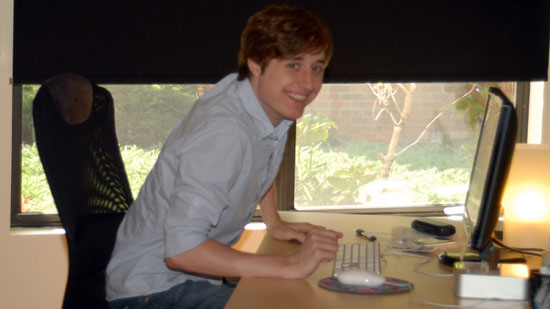
And Brett on version control:
“Since I started using version control in college, I’ve always had a hard time fitting it into how I think and code.
With Subversion, I’d always second guess my commits since they were pretty much final. Git takes all of the commit ceremony away. It fits right into my workflow and actually HELPS me get my work done.
With Git, you can make sure your commits are clean and orderly before pushing them off for the public — and your team — to see. Also, branching and stashing help me put a formal lasso around some of the stray thoughts I tend to have while coding.”
Troy Thompson on Aptana and Subversion:
“I use Aptana because it is open source, cross platform, integrated version control, extensibility (plugins), and supports every programming language I use. I use subversion for version control, nothing too unique about it.
I could just as easily use git over it and I do for shared projects as it is easier to collaborate with git.”
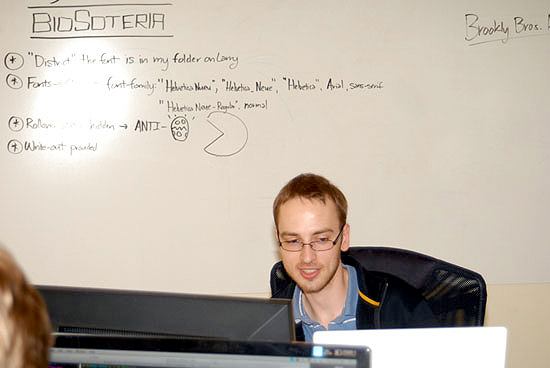
6. What encouragement can you offer towards those wanting to start a design firm?
Running a design firm is full of peaks and valleys, just like any other business. At the end of the day though, the payoff usually outweighs the hassles. There is quite a bit of competition in this field, but the camaraderie amongst our industry peers is out of this world.
I can’t think of any other industries where people freely share their tips and tricks. Occasionally I’ll look around at people from other businesses outside in their suits and ties taking their 15-minute breaks. It excites me to offer and encourage a relaxed work environment without all the corporate rules that bog down creativity.
There is great pride in watching the team you put together create wonderful work. The recognition that comes with it is quite an ego booster.
More Tony Chester
Connect with Tony on Twitter (@tonychester) or LinkedIn. He also wanted to share some thoughts on his other web projects and about OnWired so that you can learn a little bit more about how OnWired works.
Your Web Job
During OnWired’s quest to hire a project manager, we visited a lot of the “big” creative job websites, assuming they’d help us connect to some applicants.
What we found on these sites surprised us: there were designers, developers, design-developers, and more designers and developers. Those project managers we sought after? Apparently they weren’t invited to the wasteland.
Your Web Job is a creative job-hub for everybody — project managers, copywriters, SEO experts, social marketers, etc. (and, yes, even designers and developers). Your Web Job tries not to single anybody out or put too much emphasis on a particular occupation, because, in our opinion, all web jobs should be created equal.
Call us good samaritans if you’d like — somebody has to help those project managers and copywriters. Who better than us?
Please Critique Me
Designers are always trying to get a one-up on their work. Oftentimes they seek out other fellow creatives to critique and oversee their progress.
Please Critique Me started after countless DM’s on Twitter inquiring about design reviews. We decided to dabble in the idea, offering critique-seekers the opportunity to get their work reviewed by industry leaders. It didn’t matter if it was web, identity or print — we’d search the world over to find critics to cover all forms of design.
By giving honest, helpful feedback to the design community, we feel like we’re doing our part in promoting the industry we love. Our Location OnWired is located in Cary, North Carolina, right outside of the Raleigh/Durham, also known as the Research Triangle Park. I’d like to link off to our Vimeo video here as an intro to our staff and office.
Liked this interview? Share it on Twitter and have a chance to win a Wacom Tablet.
It was a pleasure to conduct this interview with Tony and it was a long process.
We met here through Six Revisions, and he was one of the people who encouraged me to sign up on Twitter. We both share a fondness for Twitter, so as a gift to you, Six Revisions and OnWired is giving away a Wacom Intuos3 via Amazon. What do you have to do? It’s simple, share this interview via Twitter by clicking on the following:
At the end of the week, we’re going to randomly select one winner using the Twitter API and announce it on Twitter. We’ll get in touch with you, and then ship you your very own Wacom Intuos3 Wacom Tablet! Thank you Tony for this wonderful and inspiring interview!
Related content
- Web Standardistas on Web Standards in Education
- Six Questions: Eric Meyer on CSS3
-
 President of WebFX. Bill has over 25 years of experience in the Internet marketing industry specializing in SEO, UX, information architecture, marketing automation and more. William’s background in scientific computing and education from Shippensburg and MIT provided the foundation for MarketingCloudFX and other key research and development projects at WebFX.
President of WebFX. Bill has over 25 years of experience in the Internet marketing industry specializing in SEO, UX, information architecture, marketing automation and more. William’s background in scientific computing and education from Shippensburg and MIT provided the foundation for MarketingCloudFX and other key research and development projects at WebFX. -

WebFX is a full-service marketing agency with 1,100+ client reviews and a 4.9-star rating on Clutch! Find out how our expert team and revenue-accelerating tech can drive results for you! Learn more
Make estimating web design costs easy
Website design costs can be tricky to nail down. Get an instant estimate for a custom web design with our free website design cost calculator!
Try Our Free Web Design Cost Calculator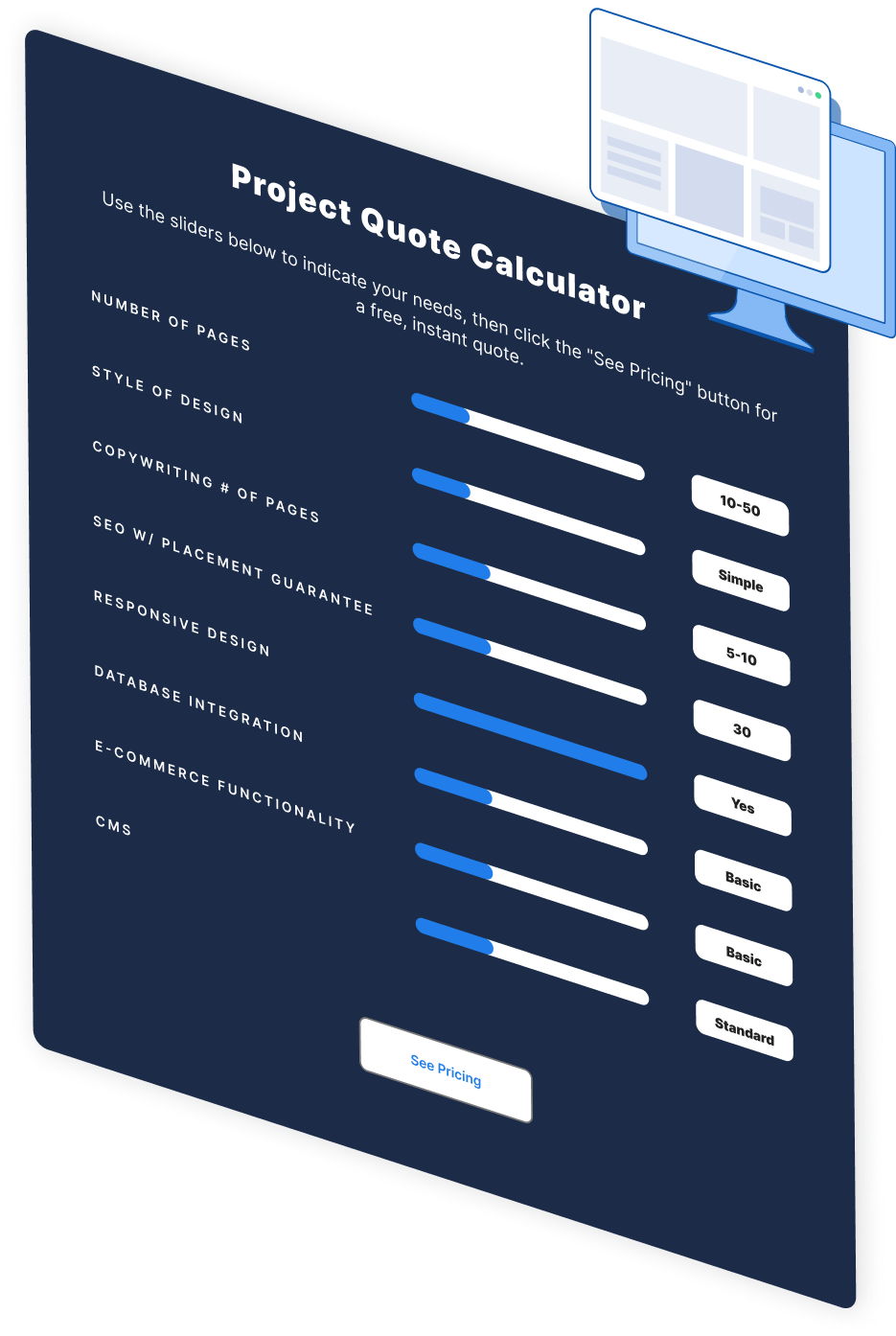


Web Design Calculator
Use our free tool to get a free, instant quote in under 60 seconds.
View Web Design CalculatorMake estimating web design costs easy
Website design costs can be tricky to nail down. Get an instant estimate for a custom web design with our free website design cost calculator!
Try Our Free Web Design Cost Calculator




